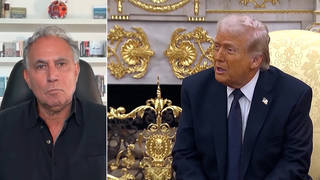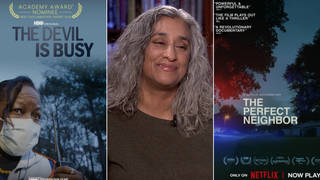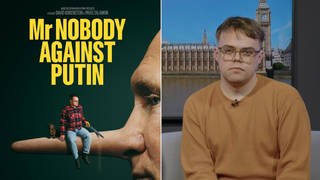
House Republicans have successfully pushed forward President Trump’s budget proposals to slash Medicaid and food stamps, putting millions of low-income Americans at risk. Anthony Wright, executive director of Families USA, a healthcare consumer advocacy organization, says the $715 billion reduction is “literally the biggest cut to the Medicaid program in history.”
Transcript
AMY GOODMAN: This is Democracy Now!, democracynow.org. I’m Amy Goodman.
Supreme Court justices heard oral arguments on birthright citizenship. We’ll be talking about that in a moment, but first we’re going to turn to the issue of Medicaid, the massive Medicaid cuts that are being proposed in the House. House Republicans have successfully pushed through proposals — have successfully pushed through proposals for Medicaid and nutrition assistance cuts as part of Trump’s budget, making his 2017 tax cuts for the wealthiest Americans permanent by taking away essential services for the rest of the country. The changes would disproportionately impact children and people living under the poverty line. The Center for Budget and Policy Priorities estimates over 14 million people could be at risk of losing Medicaid over the next decade under the proposed requirements for recipients to work, volunteer or be enrolled in school for at least 80 hours a month.
For more, we’re joined by Anthony Wright, executive director of Families USA, a healthcare consumer advocacy organization.
Tell us, Anthony Wright, what has — what have the Republicans come to at this point? What is this bill and the level, the number of millions of people who will be cut off from Medicaid?
ANTHONY WRIGHT: Thank you for having me.
The proposal that passed the Energy and Commerce Committee just a day or two ago would cut $715 billion out of the Medicaid program over the next 10 years. It’s literally the biggest cut to the Medicaid program in history, which would, just the Medicaid cuts alone, leave around 9 million Americans without coverage and, on top of other cuts and inaction and actions with regard to the Affordable Care Act, would leave about 14 million — at least 14 million Americans without coverage at the end of the term. So, this is a massive cut.
It is — it removes people from coverage largely through bureaucratic barriers that — again, the way of people getting on and staying on coverage, things like having to reapply not just every year, but twice a year, things like work reporting requirements, that tend to be so bureaucratic that people who are eligible, who are working, fall off the program, but also increased costs in terms of copays and just additional cuts to states and to providers that mean that that will impact the healthcare system that we all rely on.
AMY GOODMAN: I wanted to turn to the Republican Senator, Trump ally, Josh Hawley, among those, interestingly, criticizing Republicans who want to cut Medicaid. He was speaking on MSNBC’s Morning Joe [sic].
SEN. JOSH HAWLEY: Well, the right thing to do is not to cut Medicaid, so I’m glad to hear him say that. Manu, it ought to be just a basic foundational principle. It is wrong to cut healthcare for the working poor. And that’s what we’re talking about here with Medicaid. My state is a Medicaid expansion state. Over 20% of Missourians, including hundreds of thousands of children, are on Medicaid. And, Manu, they’re not on Medicaid because they want to be. They’re on Medicaid because they cannot afford health insurance in the private market. These are working people and their children who need healthcare. And it’s just wrong to go and cut their healthcare, when they’re trying to make ends meet, trying to help their kids, trying to make sure that they’re able to provide for their families. So I hope that the House GOP and the Senate GOP will get the message here. By the way, President Trump has said the same thing: no Medicaid benefit cuts.
AMY GOODMAN: So, that was Josh Hawley actually speaking to Manu Raju on CNN. This is independent Senator Bernie Sanders calling the proposed cuts to Medicaid a, quote, “death sentence” for millions who rely on it. He was on MSNBC.
SEN. BERNIE SANDERS: We’re going to be looking at $715 billion in cuts to Medicaid and to the Affordable Care Act. That means, Chris, that over 13 — according to the CBO, over 13 million Americans are going to lose their health insurance. And then, on top of that, what the Republicans are proposing is a $35 copayment for many Medicaid recipients.
CHRIS HAYES: Right.
SEN. BERNIE SANDERS: If you are making $16,000 a year, you know what? You can’t afford that 35 bucks. You are not going to go to the doctor.
AMY GOODMAN: Senator Bernie Sanders. Very interesting that Hawley sounds like Sanders, who is a close Trump ally. What is the significance of this divide in the Republican Party, Anthony Wright?
ANTHONY WRIGHT: It is clear that there’s many Republicans who understand the devastating impacts that this would have on their district. Many House Republican members have 25, 30%, and in some cases 50, even 60%, of their constituents that get health coverage through the Medicaid program. And that would be cut. A lot of Republican members represent rural areas, where rural hospitals will be particularly hard hit if one of the major financing streams is cut. But they need money to pay for the tax cut that they are trying to move through in quick order.
AMY GOODMAN: We’re talking about four-and-a-half trillion-dollar tax cut for the wealthiest Americans?
ANTHONY WRIGHT: Right. And they’re going to pay for that, part by increasing the deficit, but, in part, by making this massive cut, the biggest cut in history, to the Medicaid program, which is, again, a key funding source for the healthcare system we all rely on — hospitals, clinics, nursing homes, maternity wards, that all are at risk of scaling back services. Some may even close as a result.
AMY GOODMAN: So, how are you organizing to stop something like 14 million Americans from losing Medicaid?
ANTHONY WRIGHT: Yeah, so, yeah, again, 14 million people will lose coverage. But they have been activated. There have been letters and protests of hundreds of organizations against these cuts. There was an all-night marathon session where Democrats were proposing a series of amendments against these cuts. They all were rejected, but there were protesters in the hallways, folks in wheelchairs getting arrested. There is a — and there’s been protests across the country in front of congressmembers’ offices making this case, that we should not be cutting healthcare for low and working-class folks in order to pay a tax cut for the wealthiest and corporations. And that’s a message that needs to break through in the next few days, because, literally, they’re planning to vote on this in the full House next week.
AMY GOODMAN: And the Republican message, as they’re trying to hone it, as they lose around the issue of giving money from the poorest to the richest, they’re trying to say, “We’re just trying to rout out fraud.” Your final comment, Anthony Wright?
ANTHONY WRIGHT: Yeah, I mean, they say that, that they’re going after waste, fraud and abuse, but if they were doing that, this would look — this bill would look very different. The nonpartisan Congressional Budget Office has been very clear: Millions of Americans would lose coverage. More people would have increased costs in their premiums and cost sharing, both in Medicaid and through the Affordable Care Act marketplaces. And at the end of the day, we are cutting the hospitals, the clinics, the nursing homes that we all rely on. And that’s why folks need to tell their congressmember what they think about these cuts in the next few days.
AMY GOODMAN: Anthony Wright, I want to thank you for being with us, executive director of Families USA, a healthcare consumer advocacy organization.











Media Options